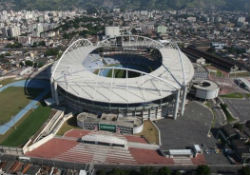Police in Brazil will begin investigating bribery and price-fixing in relation to construction contracts issued for the 2016 Olympics, an illustration of the broad set of challenges facing security officials during international sporting events.
Federal Police Chief Igor Romario told Reuters that some of the engineering firms involved in the multi-billion dollar corruption scandal at state-owned oil company Petrobras “very probably” used bribery in an attempt to secure over $10 billion worth of construction contracts for the 2016 Olympic games in Rio de Janeiro.
According to Reuters, just five companies are building most of the new stadiums and infrastructure needed for the Olympics. Executives from four of these five companies have either been jailed or sentenced on corruption charges stemming from the Petrobras investigation.
“In every situation where there has been an investigation into contracts with these companies, this model of corruption was repeated,” said Romario, who is a lead investigator into the Petrobras scandal. “”It’s possible that it was repeated in the projects for the 2016 Olympics.”
Romario added that there is not yet any evidence of wrongdoing, and that the investigation remains focused on corruption at Petrobras. The two-year probe into the state-owned oil giant has implicated over 100 people, including high-level political figures and Petrobras executives. Billionaire and senator Andre Esteves was the most recent Brazilian elite to be ensnared by the scandal, after he was arrested at his home in Rio de Janeiro on November 25.
InSight Crime Analysis
The planned probe into Olympic contracts is a reminder of just how many opportunities criminals have to cash in during large, international sporting events. The huge amount of money involved and large number of tourists expected for the Olympics present authorities with unique security challenges, which are only compounded in cities with a strong organized crime presence such as Rio de Janeiro.
SEE ALSO: Brazil News and Profiles
Brazilian authorities are unlikely to be caught completely off-guard, however, considering the country also hosted the 2014 World Cup. Officials are planning on deploying 85,000 police officers to the Games, or nearly twice the size of the police force used in London during the 2012 Olympics.
One public security threat that can’t be ruled out at events such as the Olympics is terrorism. Security officials recently stated that “terror is the number one priority” for the Olympics, as it was during the World Cup and the Pope’s visit to Brazil in 2013.

